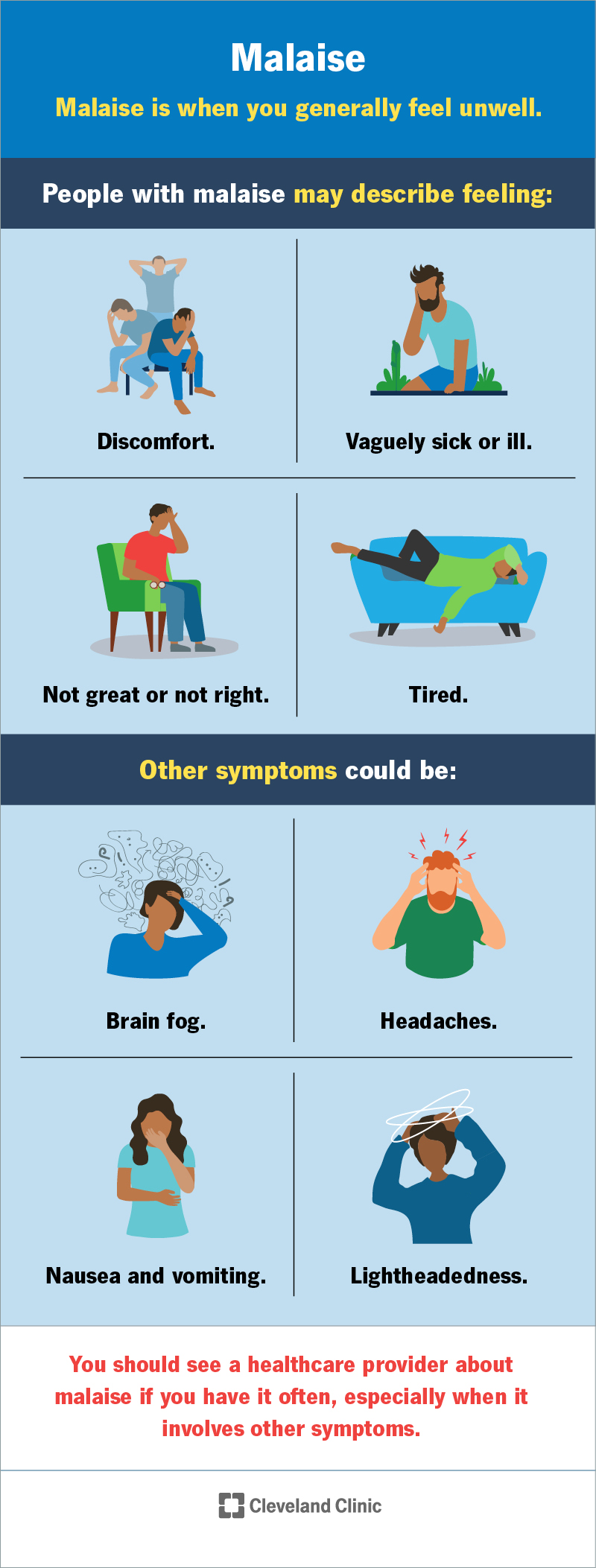Putting what you feel into words can be difficult if you’re experiencing malaise. This symptom can keep you from feeling your best, but it isn’t severe enough to make you feel actually sick. This symptom is common to many conditions and usually isn’t serious. But having it often is something you should talk to a healthcare provider about.
Advertisement
Cleveland Clinic is a non-profit academic medical center. Advertising on our site helps support our mission. We do not endorse non-Cleveland Clinic products or services. Policy

Image content: This image is available to view online.
View image online (https://my.clevelandclinic.org/-/scassets/images/org/health/articles/malaise.jpg)
Malaise is when you just generally feel unwell. It’s somewhere between feeling healthy and sick. You don’t feel well enough to say you’re in good health, but you don’t have symptoms or feel sick enough to say you have an illness.
Advertisement
Cleveland Clinic is a non-profit academic medical center. Advertising on our site helps support our mission. We do not endorse non-Cleveland Clinic products or services. Policy
Virtually everyone experiences malaise at some point in their life. But it’s typically because of minor conditions or issues. It’s often vague or hard to describe. It’s usually not serious when it happens on its own and isn’t something you experience frequently.
People with malaise may describe feeling:
Malaise is pronounced “muh-LAYZ.” It comes from French and roughly translates as “discomfort.”
Malaise is usually non-specific, which means it can happen with many medical conditions. It can happen as an early symptom before more noticeable ones appear. But malaise can also happen on its own or at any time during an illness. Conditions that can cause it include (but aren’t limited to) the following:
Advertisement
There’s one form of malaise that’s specific to a disease. Post-exertional malaise is a key symptom of chronic fatigue syndrome (myalgic encephalomyelitis).
“Post-exertional” means it happens after you push your body’s strength or endurance. That doesn’t necessarily refer to strenuous exercise or activity. For some people, it can happen after simple activities, like taking a shower or going for a walk. And even mentally taxing activities can trigger it.
Post-exertional malaise is more than just feeling tired or fatigued. People who develop it may end up bedridden or severely weakened for days. And people who’ve had it before often try hard to avoid having it again, either by pacing themselves or avoiding activities they fear might cause it.
There are a few symptoms that commonly happen alongside malaise. When it happens in combination with them, you should schedule an appointment to talk to a healthcare provider about them. They include:
There’s no way to treat malaise directly. Instead, treatments focus on whatever’s causing it. But in some cases, healthcare providers can’t find a cause. In those cases, malaise isn’t treatable. Your healthcare provider is the best source of information about whether your malaise is treatable. They can also tell you more about any possible treatment options.
Experts aren’t sure exactly how and why malaise happens, and it often happens unpredictably. That means it isn’t preventable.
You should see a healthcare provider if you have it often, especially when it involves other symptoms.
While it isn’t common, malaise can also happen as a symptom of dangerous conditions, like heart attacks or strokes. If you think you’re having one of them or have other symptoms of these conditions, you should get medical attention immediately. Call 911 (or your local emergency services number) right away.
You don’t feel sick, but you don’t feel great either. You just feel kind of unwell in a way that’s hard to put into words. When you can barely describe what you’re experiencing, the thought of trying to talk to a healthcare provider might seem daunting. But modern medicine recognizes malaise as a symptom common to many conditions.
If you’re experiencing malaise repeatedly — especially when it happens with other symptoms — it’s a good idea to talk to a healthcare provider. They know the questions to ask and can help you navigate learning more about what you’re experiencing.
Advertisement

Sign up for our Health Essentials emails for expert guidance on nutrition, fitness, sleep, skin care and more.
Learn more about the Health Library and our editorial process.
Cleveland Clinic’s health articles are based on evidence-backed information and review by medical professionals to ensure accuracy, reliability and up-to-date clinical standards.
Cleveland Clinic’s health articles are based on evidence-backed information and review by medical professionals to ensure accuracy, reliability and up-to-date clinical standards.
Cleveland Clinic’s primary care providers offer lifelong medical care. From sinus infections and high blood pressure to preventive screening, we’re here for you.
